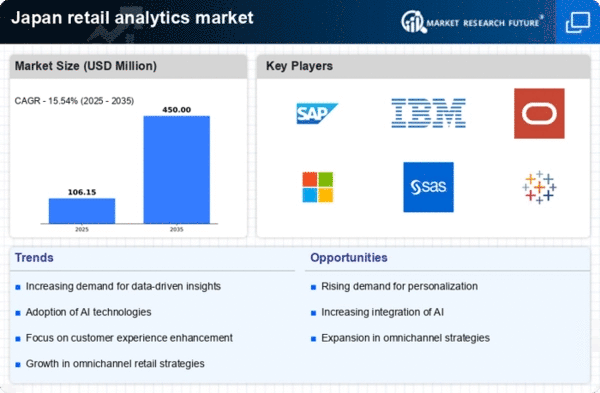Shift Towards Predictive Analytics
The shift towards predictive analytics represents a transformative trend within the retail analytics market in Japan. Retailers are increasingly leveraging predictive models to forecast demand and optimize inventory levels. This approach allows businesses to anticipate consumer needs and adjust their strategies proactively. Recent studies indicate that predictive analytics can reduce stockouts by up to 30%, significantly improving operational efficiency. As retailers seek to enhance their competitive edge, the adoption of predictive analytics tools is likely to accelerate. This trend not only streamlines operations but also contributes to a more responsive retail environment, thereby driving growth in the retail analytics market as businesses embrace data-driven forecasting.
Integration of Advanced Technologies
The integration of advanced technologies significantly influences the retail analytics market in Japan. Retailers are increasingly adopting technologies such as the Internet of Things (IoT) and big data analytics to enhance their operational capabilities. For instance, IoT devices enable real-time tracking of inventory and customer behavior, providing valuable data for analysis. Reports suggest that the market for IoT in retail is expected to reach approximately $10 billion by 2026 in Japan. This technological integration allows retailers to gain deeper insights into consumer preferences and optimize supply chain management. As a result, the retail analytics market is likely to expand as businesses seek to harness these technologies for improved performance and customer engagement.
Rising Demand for Data-Driven Insights
The retail analytics market in Japan experiences a notable surge in demand for data-driven insights. Retailers increasingly recognize the value of leveraging analytics to enhance decision-making processes. According to recent statistics, approximately 70% of retailers in Japan have adopted some form of analytics to optimize inventory management and customer engagement. This trend indicates a shift towards a more analytical approach, where data informs strategies for product placement and promotional activities. As competition intensifies, the ability to derive actionable insights from data becomes crucial for retailers aiming to improve operational efficiency and customer satisfaction. Consequently, the retail analytics market is poised for growth as businesses invest in advanced analytics tools to meet this rising demand.
Growing Emphasis on Customer Experience
In Japan, there is a growing emphasis on enhancing customer experience, which serves as a key driver for the retail analytics market. Retailers are increasingly utilizing analytics to understand customer behavior and preferences, enabling them to tailor their offerings accordingly. Approximately 65% of Japanese consumers express a preference for personalized shopping experiences, prompting retailers to invest in analytics solutions that facilitate this customization. By analyzing customer data, retailers can identify trends and adjust their strategies to meet evolving consumer demands. This focus on customer experience not only fosters loyalty but also drives sales, thereby propelling the growth of the retail analytics market as businesses strive to create more engaging shopping environments.
Regulatory Compliance and Data Security
Regulatory compliance and data security concerns are pivotal factors shaping the retail analytics market in Japan. With the increasing volume of data collected from consumers, retailers face heightened scrutiny regarding data protection and privacy regulations. The Personal Information Protection Act (PIPA) mandates strict guidelines for data handling, compelling retailers to adopt robust analytics solutions that ensure compliance. As a result, investments in secure analytics platforms are on the rise, with the market projected to grow by approximately 15% annually over the next five years. This focus on compliance not only safeguards consumer trust but also enhances the overall credibility of the retail analytics market, as businesses prioritize secure data practices.

















